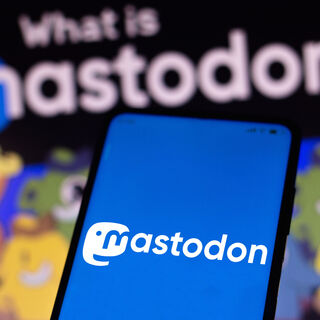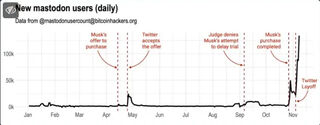Cognition
The Psychology of Mastodon: The Great Migration From Twitter
Welcome to a decentralized social network that promises to replace Twitter.
Posted December 23, 2022 Reviewed by Lybi Ma
Key points
- A lot of Mastodon's features will feel familiar to current Twitter users, but there are significant differences, too.
- Once you experience Mastodon, you suddenly realize just how much commercial advertising you are force-fed.
- This is an immersive learning experience to master decentralized thinking.

Have you heard about Mastodon? It’s the hot new thing — a “decentralized” social network that promises to replace Twitter, the world’s soapbox that was recently privatized, caught in a storm of controversy and diminishing revenues, and apparently with content moderation services severely crippled. This has led to a growth rate of 657 percent (see chart). Unlike the larger commercial social networks, Mastodon is both free to use and free of ads. It's operated by a nonprofit run by Mastodon creator Eugen Rochko, and is completely supported via crowdfunding; the costs of hosting users are spread among many different people and groups.
A lot of Mastodon's features will feel familiar to current Twitter users; you can post, share and message individual users privately. But there are some key differences, too. For example, there's a 500-character limit, instead of 280, which does feel less constrictive. Mastodon isn't a Twitter clone, and it isn't trying to be one. It is something new, but it probably won’t turn Twitter into the next AOL or Prodigy, at least right away.
The biggest difference between Mastodon and Twitter is that there is no “algorithmic boosting” of any kind – there is no manipulation of your natural newsfeed. Because Mastodon doesn’t boost for engagement, there tend to be a lot fewer hostile arguments, conspiracy theories, and celebrity fawning. Also, advertising is verboten. But once you experience Mastodon, you suddenly realize just how much advertising, spam, and phishing you are being force-fed. I find Mastodon restful. Like the first time you realized that TV is possible without commercials. Also, because journalists and scientists are leading the charge to Mastodon, my feed seems to reflect a culture of knowledge, even leaning on peer-reviewed citations.

A Few Tips for New Arrivals
Anyway, if you’re thinking of joining the mass migration, from musk to tusk, here are a few tips:
- At least to me, it feels a bit like arriving at a new theme camp at Burning Man and a chance to meet new and sometimes strange people. There’s a nice buzz. And the conversations feel far less monetizable.
- Also, like Burning Man, it takes work to be here. You have to figure things out, you have to be radically self-reliant.
- Next, again like Burning Man, you have to pick a theme camp. Choosing the right Mastodon instance will color your initial experience.
- You will find that moderation on Mastodon is imperfect but superior to what happens on Twitter or Facebook, where you’ll get banned for seemingly nonsensical reasons. At Mastodon, we are the algorithm.
- Finally, make sure to donate to support your instance-theme camp. Twitter and Facebook are free because you are the product, and surveillance capitalism was the result. Mastodon doesn't work this way, it’s egalitarian and focused on creating a better world online.
A Mindshift to Decentralized Thinking
This is an immersive learning experience to understand decentralized thinking. This is actually a significant and difficult mind shift. For example, consider the invention of money, it helped humanity learn how to count, develop the scientific approach, and shifted human thinking. And so, the invention of blockchains, cryptocurrency, and now decentralized social networking could help humanity evolve to the next evolutionary stage of cognition, decentralized thinking.
Just as digital thinking is needed to drive the digital economy, decentralized thinking is required to drive web3. Researcher Melanie Swan believes that decentralized “blockchain” thinking could have benefits for both the development of artificial intelligence and human enhancement. Decentralized thinking might give rise to new forms of consensus models such as self-mining ecologies and proof of intelligence, and could redistribute brain currencies (ideas and ideation)—all leading to humanity living cohesively and productively in the digital age.
Here’s an analogy for how mind shifts work:
Consider the story of how Léon Serpollet broke the world land speed record in 1902. In 1896, he invented and perfected the flash boiler, which made steam a much more practical source of power for the automobile. Besides being an inventor, he became the first driver of a non-electrically powered car to hold the Land Speed Record. In April 1902, on the Promenade des Anglais at Nice, he drove the Oeuf de Paques—which translates to “Easter Egg” because the car was ovoid shaped—at the heretofore unimaginable speed of 75.06 miles per hour, breaking the previous record, set in 1899. But today, pretty much anyone can drive 75 mph, and do it while drinking coffee or putting on make-up. This means that something only a daredevil racer could do a hundred years ago is commonly achieved today.
It didn’t take millions or thousands or even a hundred years for human beings to evolve into a species that is able to drive so fast. Pretty much every human being can learn how to drive that fast within a few months, demonstrating a remarkable level of mental adaptation. Human beings are capable of amazing things, that go far beyond the ability to drive really fast while drinking coffee.
In a hundred years, everyone will be a bit like Steve Jobs, with the ability to think differently. Everyone will be able to scan the web for information like an expert, design apps because they use them, and engage in what may seem like incomprehensible decentralized activities today—essentially driving your brain down the Information Highway at 75 miles per hour without breaking a sweat. Human beings are evolving every day to adapt to the digital age.
This current shift to decentralized thinking is only a transitional step to quantum thinking, which is needed to drive the societal shift to the quantum computing revolution.

Putting a Toe into the Decentralized Waters
Don't overthink it—I am constantly reminded by my siblings that as a child I was told by my parents that they were going to take me to a public swimming pool to learn how to swim. I went to the library and checked out some books about swimming. I felt I was prepared until my dad threw me into the water, and I screamed my head off—to the amusement of my older siblings. There’s really nothing you can do to fully prepare for this experience of decentralized social networking. You have to jump in.
A few final tips:
- Being early has advantages! Stake out your territory ahead of the crowd.
- If you're a scientist, read: Should I Join Mastodon? A Scientists’ Guide to Twitter’s Rival
- To find a nice instance-theme camp, try out different groups
- Here’s a great resource for planning your migration
- There are many apps for Mastodon, try a few and then pick your fave. It’s all free and open source.
- To meet people, write an #introduction post soon after you arrive.
And remember, just like Burning Man, don’t sweat it: Fun's first, safety’s third.
References
La Cava, L., Greco, S. & Tagarelli, A. Understanding the growth of the Fediverse through the lens of Mastodon. Appl Netw Sci 6, 64 (2021). https://doi.org/10.1007/s41109-021-00392-5
Resnick, M. (1999). Decentralized Modeling and Decentralized Thinking. In: Feurzeig, W., Roberts, N. (eds) Modeling and Simulation in Science and Mathematics Education. Modeling Dynamic Systems. Springer, New York, NY. https://doi.org/10.1007/978-1-4612-1414-4_5
M. Swan, Blockchain Thinking : The Brain as a Decentralized Autonomous Corporation in IEEE Technology and Society Magazine, vol. 34, no. 4, pp. 41-52, Dec. 2015, https://doi.org/10.1109/MTS.2015.2494358.




